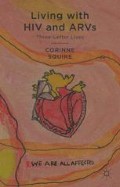Abstract
In the autumn of 2011, I meet Queenie, an HIV positive woman in her 50s who lives in a small flat behind a fast-food restaurant on the North Circular with her children. Queenie came to the United Kingdom as an asylum seeker, discovered her HIV status while waiting for her claim to be decided, and is now doing well on antiretroviral medication. She is hoping to move to a bigger flat soon. She is extremely welcoming, even though I get lost and arrive late. She has two mobile phones and calls me from both to help me find her. In the interview, she describes the network of support of which she is a part, which operates largely through these phones. For instance, she frequently sends encouraging texts to friends of hers whom she has met at support groups, who are more recently diagnosed, less well, still struggling with the asylum process, or all three. While we are doing the interview, the phones are beeping constantly. Sometimes, she breaks off to text back. It turns out that this is a form of support she has developed and is giving out of necessity, not choice. Some local support services have closed; others are too far to reach for those who are not well. She mostly works by texting because texts are cheap, calling costs money, and so does travelling to meeting places. Queenie, despite her optimism and activity, is not well. She finds moving difficult; she has bad neuropathy, that is, damage to peripheral nerves, caused by opportunistic infections, HIV medications, or HIV itself, which causes foot, hand, and limb pain.
Nicco: Okay, my name is Nicco surname is (second name), I was diagnosed 2008, I am HIV positive, I am on treatment, ARVs, regime 1, 3TC, D4T, er, nevirapine, mhm, I like my status too much. But once before I was getting challenges through my family but I was able to accept, it was need (ed) to live and to be positive, and also I like to (make) change to my community, because our persons is not open to the status, and also I want to change, to give more information to change the situation of the community.
Nicco (South Africa 2012)
People living with diagnosed HIV in the UK can expect a near-normal life expectancy, particularlyif diagnosed promptly… where antiretroviral therapy is available, it has transformed HIV infection from a fatal illness to a chronic manageable condition.
(Health Protection Agency 2011a: 4, 6)
Value for money is best obtained when national AIDS responses make timely investments that are in the right places; utilise the right strategies; increase efficiency, reduce costs and promote innovation.
(UNAIDS 2011a: 31)
Access this chapter
Tax calculation will be finalised at checkout
Purchases are for personal use only
Preview
Unable to display preview. Download preview PDF.
Author information
Authors and Affiliations
Copyright information
© 2013 Corinne Squire
About this chapter
Cite this chapter
Squire, C. (2013). Being Naturalised. In: Living with HIV and ARVs. Palgrave Macmillan, London. https://doi.org/10.1057/9781137313676_3
Download citation
DOI: https://doi.org/10.1057/9781137313676_3
Publisher Name: Palgrave Macmillan, London
Print ISBN: 978-1-349-32939-7
Online ISBN: 978-1-137-31367-6
eBook Packages: Palgrave Social Sciences CollectionSocial Sciences (R0)

